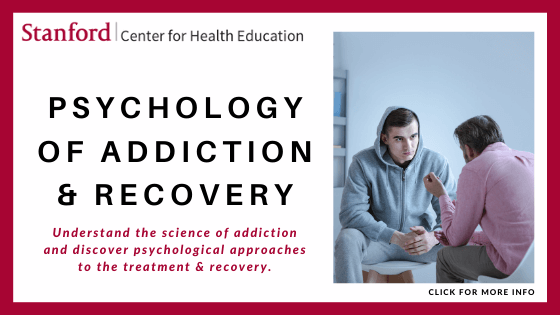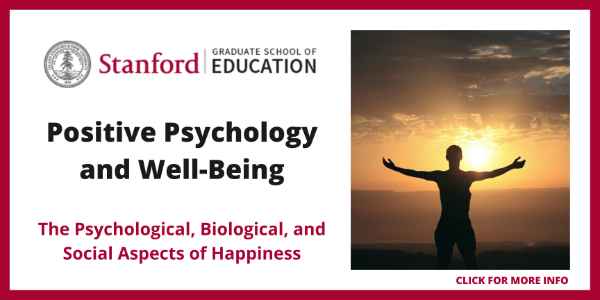Last updated on September 16th, 2022.
If you are a mental health professional and need to take some continuing education courses, then you should continue reading this article. There are dozens of different types of continuing education courses that you can take to further your career and keep you up to date on the latest mental health information.
Continuing education courses can either be done in a classroom setting or online. Most mental health professionals choose to take online courses since they can work at their own pace and continue their usual busy work schedule. Taking the courses online is also more convenient, comfortable, and cost-effective.
Here are the 5 Great Courses for Continuing Education for Mental Health Professionals:
- Stanford University Psychology of Addiction
- Harvard University
- School of Positive Transformation
- Stanford University Positive Psychology
- Sounds True Trauma Summit
In this article, we will be going through five great courses for continuing education for mental health professionals. All of the courses we will be exploring are online courses, and they are all of different lengths and centered around different types of continuing education.
It is important for counselors to continue their education since the mental health field changes often, and getting more education allows one to advance in their career.
- Counselors provide an incredibly important service to lots of people all around the world, so it is imperative they make sure to keep up with all of the latest changes to ensure they are providing their absolute best for their clients.
- New research changes methodology on a regular basis, and there could also be social changes that they are required to adhere to.
- As counselors continue to learn, their perspective on certain things may change, so they will start to understand things more deeply because they can see more sides of the same situation.
- Learning new things on a constant basis can give counselors a feeling of accomplishment, which in turn can boost their confidence and make them feel more ready to take on new challenges.
- Being an excellent counselor has a lot to do with their level of education.
Continuing to educate yourself is not just important in the mental health field, but a lifestyle of learning is important for everyone.
One CEU is equivalent to 10 hours of participation in continuing education courses. The number of CEUs LPCs need depends upon which state they live in.
| State | CEUs Required | How Often |
| Alabama | 4 | Every two years |
| Alaska | 4 | Every two years |
| Arizona | 3 | NA |
| Arkansas | 2.4 | Every two years |
| California | 3.6 | Every two years |
| Colorado | 4 | Every two years |
| Connecticut | 1.5 | Every year |
| Delaware | 4 | Every two years |
| Florida | 3 | Every two years |
| Georgia | 3.5 | Every two years |
| Hawaii | None | Never |
| Idaho | 2 | Every year |
| Illinois | 3 | Every two years |
| Indiana | 4 | Every two years |
| Iowa | 4 | Every two years |
| Kansas | 3 | Every two years |
| Kentucky | 1 | Every year |
| Louisiana | 4 | Every two years |
| Maine | 5.5 | Every two years |
| Maryland | 4 | Every two years |
| Massachusetts | 3 | Every two years |
| Michigan | None | Never |
| Minnesota | 4 | Every two years |
| Mississippi | 1.2 | Every year |
| Missouri | 4 | Every two years |
| Montana | 2 | Every year |
| Nebraska | 3.2 | Every two years |
| Nevada | 2 | Every year |
| New Hampshire | 4 | Every two years |
| New Jersey | 4 | Every two years |
| New Mexico | 4 | Every two years |
| New York | 3.6 | Every three years |
| North Carolina | 4 | Every two years |
| North Dakota | 3 | Every two years |
| Ohio | 3 | NA |
| Oklahoma | 2 | Every year |
| Oregon | 4 | Every two years |
| Pennsylvania | 3 | Every two years |
| Rhode Island | 4 | Every two years |
| South Carolina | 4 | Every two years |
| South Dakota | 4 | Every two years |
| Tennessee | 1 | Every year |
| Texas | 2.4 | Every two years |
| Utah | 4 | Every two years |
| Vermont | 4 | Every two years |
| Virginia | 2 | Every year |
| Washington | 3.6 | Every two years |
| West Virginia | 4 | Every two years |
| Wisconsin | 3 | Every two years |
| Wyoming | 4.5 | Every two years |
If you are looking to further your education in mental health, there are a lot of different ways to do so, but here we will explore just three of the best options.
- Certification Programs: Certification programs are usually offered by accredited institutions, and they typically last several months or even up to a few years. You will need to renew your certification periodically or even become re-certified.
- Extension Schools: Extension schools or programs are departments within colleges that offer classes to students who want to learn more about certain subjects that are not available in the regular college program. These schools are only to extend knowledge and skill, and they do not give any credits.
- Graduate Post-Secondary Degrees: A graduate post-secondary degree is obtained after you have graduated from college and earned your associate's or bachelor's degree. A graduate post-secondary degree is a master's degree.
Up next, we'll share five of our favorite resources for mental health professionals to find continuing education.
This Stanford University six-week long course, is guided by Dr. Anna Lembke. It goes over different methods to enhance recovery and how to establish innovative addiction treatments.
- When broken down, this course takes about five to six hours per week to complete.
- The price of this online course is $1,500.
- After completing the course, you will receive a certificate of completion from the Stanford Center for Health Education.
- You will have a better understanding of the history of addiction and an intuitive grasp of the psychological and neurological effects of addiction after completing this course.
- You will also have a new awareness of how peer-based policies can be used to treat addiction and gain some helpful insights into psychological and biological approaches to recovery.
Global Health Delivery by Harvard University is a 10-week course that is guided by an expert university faculty, and it has you analyze the influence that power and social structures have in shaping disease response.
- When broken down, this course takes about eight to 10 hours per week to complete.
- The price of this online course is $2,200.
- After completing this course, you will receive a certificate of completion from Harvard's Office of the Vice Provost for Advances in Learning (VPAL).
- By the end of this course, you will have a better understanding of the restrictions and challenges facing healthcare delivery, how social and biological factors influence the spread of disease, and a plan on how to implement health interventions.
This is a 12-week course that is guided by 12 world-leading experts brought by the School of Positive Transformation. It is a life-changing transformative science that will give you a variety of amazing tools to enrich your work.
- Not only will you have 12 great teachers, but you will also have course facilitators to support your learning experience.
- You can take as long as you need to complete the course, from six to 24 months.
- The price of this online course is $590.
- After completing this course, you will receive a Positive Psychology Practitioner Certificate from the Continuing Professional Development (CPD) Certification Service.
- From this course, you will get tools to transform your life and the lives of others, and the knowledge of how to apply those tools with communities, clients, organizations, and yourself.
Learn about a comprehensive approach to well-being in the Stanford University course, Positive Psychology and Well-Being: The Psychological, Biological, and Social Aspects of Happiness. This training will be beneficial for anybody looking to discover happiness in a personal or professional situation.
This course includes the most recent findings in the domains of positive psychology, being:
- Fields of positive psychology
- Well-being theory
- And the neuroscience of emotion
Over the course of six weeks, you will discover practical methods for improving your level of happiness every day. The role that relationships and social dynamics play in your life will also be examined, as well as frameworks for understanding how the "state of flow," mindfulness and meditation, and spirituality may improve your general wellness.
This other course by Sounds True contains over 20 hours of teachings by over 20 different presenters, and it is based solely on all types of traumas.
- The price of this online course is $97.
- Almost everyone has experienced some form of unresolved trauma in their life, and it is one of the most misunderstood psychological conditions, but thanks to this summit, it is easier to understand the mechanics of trauma.
- In just ten days, you can learn how to reshape the neural landscape, help others heal emotionally from different types of trauma, address developmental or childhood traumas to rebuild intimacy, and more.
Who Can Offer CEU or CE Credits?
Taking continuing education courses is very important and worth it if you are looking to further your career or if you are trying to stay up to date on all of the new practices and knowledge in the mental health field. Always remember that no matter where you are in your career, it is never too late to continue your education.
If you aren't already in the profession, here are the way you can become a certified mental health counselor. And if you want to find out how much does a mental health counselor make, that article is for you!





0 Response to "Become a Continuing Education Provider Mental Health"
Post a Comment